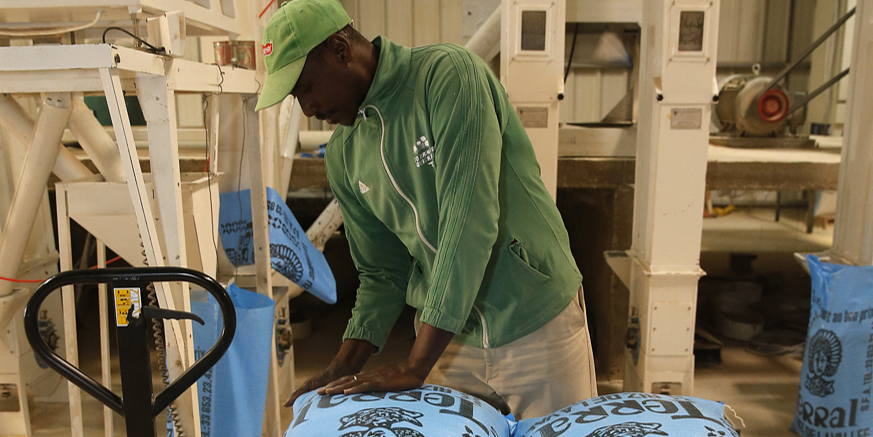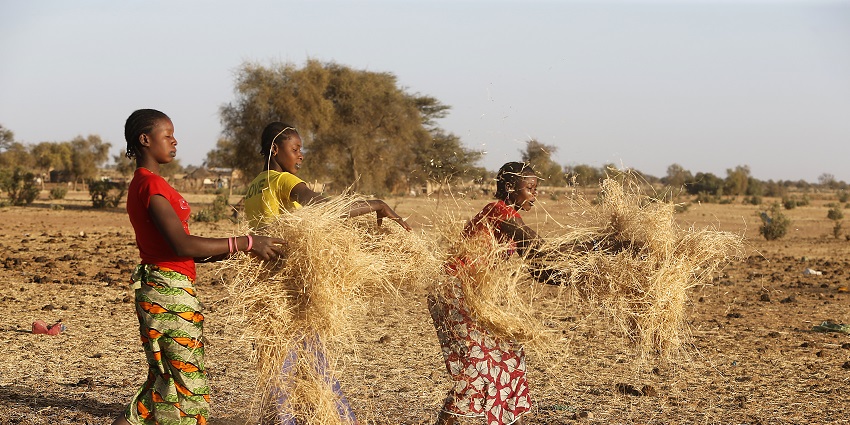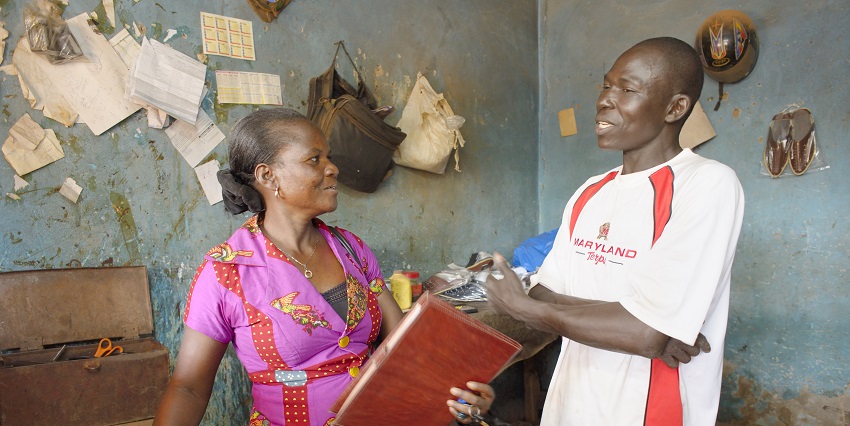€4.6M
Turnover
3 125
Number of beneficiaries
76
Number of employees
100%
Rural beneficiaries
Senegal
Financial services
Funding granted
Investment of €480,000
Foundation Partner
since 2013
Context :
The Senegalese Food Industry (SFA) is developing an inclusive value chain based on rice production and marketing and is encouraging rice production by smallholder farmers in the Senegal River Valley through a long-term partnership. SFA is thus contributing to Senegal's goal of self-sufficiency, which still imports 751,000 tons of the rice it consumes.
The company:
Founded in 2013, SFA produces white rice from paddy grown by small producers in the Senegal River Valley. The company thus controls the entire value chain. It provides producers with stable prices and access to appropriate financing by playing a leading role in securing producers' incomes through a contract farming model and developing an inclusive rice sector.
Impact :
The SFA established itself in the river valley to develop the local rice value chain and thus meet the national challenges of food self-sufficiency. The SFA thus participates in the promotion of local production, drawing on the country's resources and skills. "SFA played a major role in helping us get out of the rut by providing us with credit to cultivate larger areas. SFA provides us with inputs on time and supports us. I partnered with my brothers to cultivate a larger field and I share the profits with my family" (Sheikh, producer)
The SSNUP program finances a first agricultural project in Senegal

©FGCA/Godong
To support smallholder farmers, the Swiss Agency for Development and Cooperation and the Luxembourg Agency for Development Cooperation and Humanitarian Action, coordinated by ADA, have launched the Smallholder Safety Net Upscaling Programme (SSNUP). With a budget of €55 million over 10 years, the programme aims to sustainably strengthen safety nets for smallholder farmers in Africa, Latin America, and Asia by stimulating the development of agricultural value chains.
The program draws on the knowledge and expertise of the technical assistance services of impact investment funds already active in this field. The Grameen Crédit Agricole Foundation is one of the impact investors responsible for implementing the SSNUP. It will provide its technical assistance expertise to the organizations it supports—microfinance institutions and social enterprises—to design and develop financial and non-financial solutions for mitigating and transferring agricultural risks for various actors in value chains.
An impactful agricultural project in Senegal
The first organization supported by the Foundation under the program is SFA (Sénégalaise des Filières Alimentaires), a social enterprise working to develop an inclusive rice value chain in Senegal. Founded in 2013, SFA produces white rice from paddy grown by small producers in the Senegal River Valley. It provides them with technical support through training on best agricultural practices and facilitates their access to markets and financing by connecting them with local donors.
Despite this technical support provided by SFA, small producers' yields remain below their potential. This is due in part to the fact that producers remain reluctant to implement the agricultural practices promoted by SFA without first being able to see their positive effects.
The SSNUP program will strengthen this technical support for producers through a technical assistant mission with a budget of €11,000. This 6-month project aims to create 20 demonstration fields in SFA's operational areas, in which best agricultural practices will be used. These demonstration fields will allow around sixty relay producers to be trained on best practices to optimize their production and to demonstrate to all producers in the area the positive impacts of these practices on agricultural yield and production quality. Exchange sessions and training sessions led by the relay producers will allow them to, in turn, pass on their learning to more than 2,000 small producers.
The expected results of this project are based on three pillars: strengthening the skills of trained farmers; increasing production and quality for trained farmers; and increasing income for trained farmers and their households. This is a high-impact project that will directly contribute to the development of the rice value chain and food security in Senegal.
The Foundation makes a new investment in SFA

© Philippe Lissac
The Grameen Crédit Agricole Foundation has signed a new financing agreement with Sénégalaise des Filières Alimentaires (SFA), a partner of the Foundation since 2013, in the form of an equity investment. With this new equity investment of €137,000, the Foundation is strengthening its support for SFA, a social enterprise developing an inclusive value chain based on the production and marketing of rice.
The SFA encourages the production of quality rice by smallholder farmers in the Senegal River Valley through a long-term partnership. It provides them with access to financing and technical support. The paddy is processed into white rice and sold on the Senegalese market under the Terral brand. The SFA thus contributes to Senegal's goal of self-sufficiency, which still imports 751,000 tons of the rice it consumes.
___________________________________________________________
Created in 2008, under the joint leadership of Crédit Agricole SA's management and Professor Yunus, 2006 Nobel Peace Prize winner and founder of Grameen Bank, the Grameen Crédit Agricole SA Foundation is a multi-sector operator that contributes to the fight against poverty through financial inclusion and social impact entrepreneurship. As an investor, lender, technical assistance coordinator, and fund advisor, the Foundation supports microfinance institutions and social enterprises in nearly 40 countries.
A successful first year for the Solidarity Bankers program
By Carolina Herrera, Grameen Crédit Agricole Foundation

© Philippe Lissac
At the initiative of the Grameen Crédit Agricole Foundation and Crédit Agricole SA, skills-based volunteering missions labeled "Solidarity Banker" are offered to Crédit Agricole Group employees on behalf of microfinance institutions or social impact companies supported by the Foundation.
Senegal, Morocco, Haiti…: a great success for the first year
Less than a year after its launch in 2018, the program's success confirms employees' commitment and willingness to support social impact projects. This is the first time a partnership of this type has been launched by Crédit Agricole and the Grameen Crédit Agricole Foundation. The objective is twofold: first, to promote the skills of Crédit Agricole Group employees and second, to provide additional support to the Foundation's partner microfinance institutions and companies with one- to two-week field missions.
In 2018, six missions were launched, three of which were completed in 2018 and three planned for 2019. To date, four missions are already available for the third quarter of 2019. In 2018, six missions were launched, three of which were completed in 2018 and three planned for 2019. For example, a mission took place in Cambodia with the support of Crédit Agricole's International Retail Bank (BPI), to support the human resources management of Chamroeun, a partner microfinance institution that serves more than 27,500 clients. Another mission was conducted in Senegal, in partnership with Crédit Agricole Franche-Comté, for the Laiterie du Berger, a social enterprise in which the Foundation is a shareholder. Furthermore, with the support of the Regional Fund, the Solidarity Banker who carried out the mission left for 2 years to support Kossam, the Dairy project to structure the milk sector in Senegal.
A mission launched in 2018 will be carried out in July 2019 in cooperation with Crédit du Maroc and Crédit Agricole SA to improve the Al Karama Foundation's anti-money laundering and counter-terrorist financing (AML-CFT) systems. The institution currently supports more than 26,200 clients in Morocco. Another mission launched in 2018 will be carried out in Haiti to support Palmis Enèji, a social enterprise that offers clean and accessible cooking and lighting solutions to Haitian households. Crédit Agricole Corporate Investment Bank is supporting the Solidarity Banker, which will carry out the entire mission through skills sponsorship.
Cambodia, Kenya, Tajikistan… in 2019 the program changes scale
To date, six missions have been launched in 2019. One mission is for Kossam, the Laiterie du Berger project that aims to develop a sustainable dairy sector in Senegal. The Solidarity Banker will be tasked with supporting Kossam in the deployment of a digital application called "commcare collection." Another mission is planned to support the financial management and organizational structure of Cirque Phare (PPSE) in Cambodia. PPSE aims to promote social inclusion and youth empowerment through Cambodian culture and arts. Another mission will be for ACRE Africa, which offers crop insurance services to smallholder farmers. The Solidarity Banker will be tasked with analyzing the organization's new business strategy.
For these first missions launched in 2019, the selection process for Solidarity Bankers has been finalized. To date, three new missions are available: a "business model" role for the microfinance institution Humo in Tajikistan, a "Management Control" role to support the Musoni institution in Kenya, and a "digital" role to support the social enterprise SFA in Senegal.
Other missions are currently being planned with the support of Crédit Agricole Group entities and regional banks. With this initiative, the Group reaffirms its commitment to supporting employee solidarity initiatives and working alongside the Foundation to promote more inclusive and sustainable finance.
For more information, Click here.
In 2018, the Foundation consolidated its presence in West Africa with 8 new loans

© Didier Gentilhomme
Over the past year, the Grameen Crédit Agricole Foundation has strengthened its presence in West Africa with 8 new financings, including 3 from new partners.
In Mali, the Foundation has funded Kafo Jiginew, a mutual network of savings and credit unions that offers local financial services (savings, credit, microinsurance, fund transfers, and other services) to as many people as possible in Mali to improve their living conditions. The institution currently has 48,000 active clients, including 92% clients in rural areas. The Foundation has granted it a loan in local currency equivalent to €3 million over a five-year period.
In Benin, the Foundation granted a local currency loan equivalent to €1.4 million to a new partner, PEBCo Bethesda, whose mission is to improve people's living conditions by providing quality financial and non-financial services. The institution offers group and individual loans and has approximately 95,000 active borrowers, including 641 women and 331 in rural areas.
In Togo, the Foundation also funded a new partner, Assilassimé, with a loan in CFA francs equivalent to €500,000. Assilassimé is a program created in 2012 by Entrepreneurs du Monde for marginalized people. The institution provides them with financial (microcredit) and non-financial services (training, individualized support, social referrals). It currently has nearly 30,000 clients, including approximately 95,000 women.
In Burkina Faso, the Foundation also made three new investments in 2018 with existing partners, bringing its total commitments in the country to more than €4 million, or €13.81 billion of its commitments in sub-Saharan Africa as of the end of December 2018. ACFIME received a loan in FCFA equivalent to €305,000 over a three-year period. It is a microfinance institution that helps bridge the gap not covered by large MFIs operating throughout the country, as ACFIME's loans have very strong potential for social impact. It currently has 18,600 clients, including €901 billion women. PAMF-BF, for its part, received a loan in local currency equivalent to €1 million over a three-year period. The institution, which has approximately 28,400 clients, is primarily engaged in collecting savings and granting loans in Burkina Faso, in order to help better meet the financial needs of low-income populations within a strengthened framework of protection for its members and users. Finally, ACEP Burkina received a local currency loan equivalent to €1.5 million over a three-year period. Acep is a microfinance institution specializing in financing microenterprises and very small businesses in urban centers and their inner suburbs. The loans granted are primarily intended to finance working capital and investment needs. To date, the institution has 11,000 active borrowers.
Finally, in Senegal, the Foundation granted a local currency loan equivalent to €762,000 to CAURIE Microfinance, a socially responsible and financially viable microfinance institution whose mission is to contribute sustainably to the economic and social advancement of poor microentrepreneurs, primarily women. CAURIE currently has 71,000 clients, including 98% women. The Foundation also granted €100,000 in financing to SFA (Sénégalaise des Filières Alimentaires) in the form of a shareholder current account. SFA is a social enterprise that develops an inclusive value chain based on the production and marketing of rice, and in which the Foundation has been a shareholder since 2013.
For more information on the Foundation's partners, click here.
